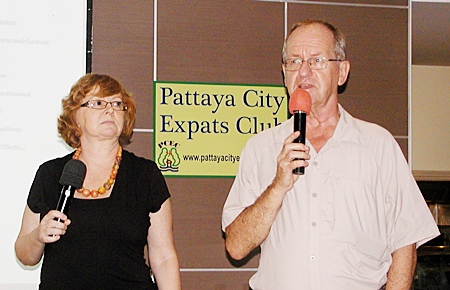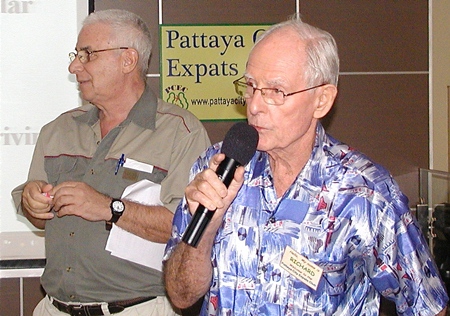Master of Ceremonies David Meador welcomed everyone to the March 20, 2011 Pattaya City Expat Club meeting at Amari’s Tavern by the Sea Restaurant. After the usual announcements, David introduced Dr. Ganyanan Punturat M.D. an Ophthalmologist from Phyathai Sriracha Hospital. David also noted that a nurse from the hospital was in the back alcove providing free blood pressure checks.
The subject of Dr. Ganyanan’s presentation was cataracts; an eye disease that progresses slowly, but if left untreated is potentially blinding. With the aid of diagrams, she described the eye and the structure of the lens. The lens is a clear part of the eye that helps to focus light, or an image, on the retina (light-sensitive tissue) at the back of the eye. Normally light passes through to the retina where it is changed into nerve signals that are sent to the brain. The lens must be clear for the retina to receive a sharp image. If the lens is cloudy from a cataract, the image will be blurred. Dr. Ganyanan showed two side by side pictures of an image as seen through a normal eye and through one with cataracts.
 Sermsakdi takes advantage of the free blood pressure checks provided by a nurse from Phyathai Sriracha Hospital.
Sermsakdi takes advantage of the free blood pressure checks provided by a nurse from Phyathai Sriracha Hospital.
A cataract is a clouding of the lens that affects your vision. Cataracts are most common in older people. The most common symptoms are blurry vision, faded colors, glare, not seeing well at night, and double vision. She described the various classifications of cataracts such as nuclear, cortical, mature, and hyper-mature. Cataracts can be caused for a variety of reasons such as long-term exposure to ultraviolet light or radiation. They can also be the secondary effects of other diseases such as diabetes, hypertension, or trauma. Also, if you have a family history of cataracts, you are at higher risk of developing cataracts.
 MC David Meador opens the meeting by inviting new guests to introduce themselves, and to tell us a bit about their backgrounds.
MC David Meador opens the meeting by inviting new guests to introduce themselves, and to tell us a bit about their backgrounds.
Cataracts usually develop slowly so new eyeglasses, brighter lighting, anti-glare sunglasses or magnifying lenses can initially help. However, after a period of time, surgery may become necessary.
Dr. Ganyanan described the surgical process, which involves removing the cloudy lens and replacing it with an artificial lens. In surgery, an incision is made into the capsule of the cloudy lens in order to remove the lens. There are two types, one is extra-capsular extraction and the other is intra-capsular extraction. The first involves removing the lens but leaving a majority of the lens capsule. The second involves removing the entire lens capsule. She mentioned that a relatively new process is called phacoemulsification (high frequency sound waves are used to break up the lens before extraction), which allows for a shorter recovery time – about one to two weeks. The replacement lens, called an intraocular lens, is plastic and remains in the eye permanently.
After, Dr. Ganyanan answered several questions and fellow member Gavin Waddell, who is also the international executive for the hospital, gave everyone an update on the hospital’s current promotions.
David Meador then updated everyone on upcoming events and called on “Hawaii” Bob Sutterfield to conduct the always informative and often humorous Open Forum, where questions are asked and answered about living in Thailand, Pattaya in particular.
 This week’s presentation was given by Dr. Ganyanan Punturat M.D., an Ophthalmologist from Phyathai Sriracha Hospital. Dr. Ganyanan’s presentation was about cataracts; an eye disease that progresses slowly, but if left untreated is potentially blinding.
This week’s presentation was given by Dr. Ganyanan Punturat M.D., an Ophthalmologist from Phyathai Sriracha Hospital. Dr. Ganyanan’s presentation was about cataracts; an eye disease that progresses slowly, but if left untreated is potentially blinding.




